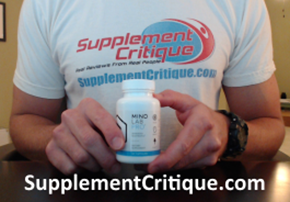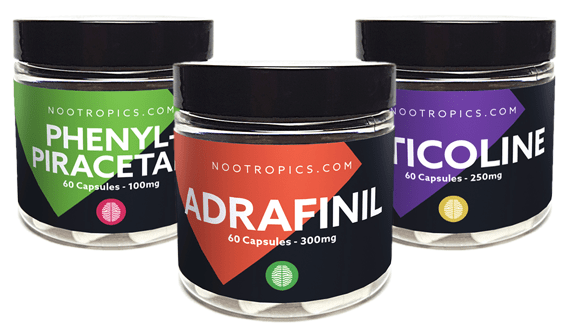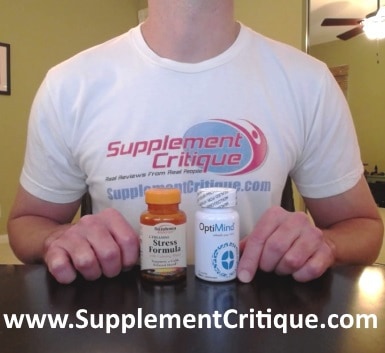Nootropics – Smart Pills Glossary
By: Rob MillerNootropics are a relatively new category of supplements that are essentially referred to as “smart drugs”. They are compounds or a mix of compounds that aid in increasing cognitive abilities, focus and motivation, as well as short and long term memory function.
We here at SupplementCritique.com have been testing dozens of these supposed ‘brain pills’ and continually strive to give you the most up to date and factual information concerning these supplements.
The below compounds are commonly found in a wide variety of Nootropic supplements, and the purpose of this glossary is to help you get a better understanding of how they are supposed to work.
Sorted A – Z
1,3 Dimethylamylamine (DMAA)
DMAA is a substance that used to be found in literally dozens of supplements, ranging from cognitive enhancers to pre-workout supplements. Originally developed and marketed as a nasal decongestant, DMAA worked by constricting blood vessels and operated as a very effective stimulant.
I personally have used dozens of supplements containing DMAA, and it was my “drug of choice” for a long time when I needed a kick to get my workouts going or sit down and study. However, the FDA banned it’s use in supplements in 2013, effectively removing it from the market.
Alpha GPC
A natural choline compound found in the brain, Alpha GPC actually delivers choline to the brain via the blood brain barrier. Some studies suggest that, via the use of Alpha GPC compounds, persons suffering from cognitive disorders including stroke and Alzheimers disease saw a recovery in their symptoms with 28 days of usage.
Alpha GPC can be found in numerous cognitive enhancement products, including Alpha Brain, Mental Bright, and Addium.
Bacopa (Bacopin)
Bacopa monierri, also known as Brahmi, is a plant native to India that has been traditionally used in Ayurvedic medicine for a whole host of problems, but especially those of anxiety and intellect.
In rat studies, Brahmi improved memory retention and reduced amnesia caused by electroconvulsive shock, scopolamine intoxication, and/or immobilization. Scary stuff….
Bacopa’s effect on humans was put to the test in a double-blind, randomized study with a placebo control group.
All of the volunteers were healthy and between the ages 40 and 65.
The Facts
- Each group was given a capsule (whether Bacopa or placebo) of either 300 mg if the individual weighed less than 90 kg or 450 mg if he or she weighed more than 90 kg.
- Seventy-six subjects completed the trial – four from each group left, only one of whom left due to gastrointestinal difficulties with Bacopa.
- Three tests (lasting approximately an hour) were given to each patient, including:
- baseline (first) test (before medication is administered)
- six to eight weeks into the trial to check-in (no test)
- second test approximately three months later, then patient ceases taking capsules
- post-trial (third) test approximately six weeks later
A testing session consists of completing various tasks that measure a multitude of memory-related abilities, as well as psychological state.
Bitter Orange Extract (Synephrine)
Bitter Orange is a plant native to practically every continent in the world, and is actually a banned substance by the NCAA and other sports regulatory organizations.
It works similarly to DMAA, and has been used in the past both as a nasal decongestant, and to help people suffering from chronic fatigue syndrome. Not surpsignly, it has also found it’s way into a wide array of weight loss / fat burning supplements, including Cellucor C4 Extreme, Alpha Rush Pro, and Shred JYM.
In these products it’s typically marketed as an “ephedrine free” formula, namely because it supposedly works similarly to the now banned substance Ephedrine.
Caffeine
The worlds most consumed drug, Caffeine has long been known as the most commonly used nootropic substance. It’s used in practically every nootropic supplement we’ve tested to varying degrees, and is commonly stacked with numerous other nootropics like L-Theanine and GABA.
The most interesting thing to note about Caffeine is that it is widely marketed under different names and in different forms. If you see the ingredients yerba mate, methylxathine, Trimethylxanthine, or 1,3,7-trimethylxanthine, don’t be fooled.
They’re are just fancy names for caffeine.
Choline
Choline and its derivatives are not vitamins per se, but in 1998 the Institute of Medicine (IOM) recognized them as essential nutrients.
The reasoning underlying this decision was that choline is necessary in a variety of ways for the maintenance of human health.
According to Oregon State University’s Linus Pauling Institute, choline is: used in the synthesis of structural components needed to maintain cell membrane integrity, a precursor to the neurotransmitter acetylcholine (which is involved in muscle control and memory), and able to keep both fat and cholesterol from collecting in the liver.
Dimethylaminoethanol (DMAE)
DMAE has been widely used to help people suffering from a wide range of disorders, including ADHD, Alzheimers, and Autism. It’s actually used to build the chemical choline, and may increase the production of acetylcholine.
Some of the benefits of DMAE supplement ingestion include improved memory and mood, increased intelligence, imporoved athletic performance, and increase physical energy.
GABA (gamma-Aminobutyric Acid)
GABA is an amino acid that is the chief inhibitory neurotransmitter in humans. This is another substance that is present in practically every nootropic supplement we’ve tested, and it’s been shown to help cause feelings of relaxation and calm, and even may help to suppress motion sickness.
You can find GABA in practically EVERY nootropic supplement on the market, including Adderin and Geniux.
As a nootropic substance, GABA is interesting. Because it is unable to pass through the blood brain barrier in sufficient quantities, some say it’s completely ineffective.
However, there is a substance called Phenibut which essentially put’s a “phenyl ring” around GABA and allow it to cross the blood brain barrier. The effect is enormous, producing feelings of calm, intense focus, but not making you feel tired / dizzy.
Ginkgo Biloba
Used for thousands of years in Ancient Chinese medicine, Ginkgo Biloba has been used to treat numerous problems, including anxiety, dementia, vision problems, mental functioning (including memory and thinking speed), and even help women with PMS symptoms.
I have personally taken many supplements containing it throughout the years, and it works even more effectively when stacked with other compounds like Ginseng and L-Theanine.
Gingko Biloba is a bit controversial in nature, as some consumer groups have urged the FDA to call for it’s ban after a federal study found that the supplement has the potential to cause liver cancer in mice. As of 2015, Gingko Biloba is still readily available over the counter.
Ginseng
Ginseng has been claimed to help a wide array of issues, including helping men suffering from Erectile Dysfunction (ED), helping act as a stimulant in pre workout supplements, and even used as a treatment for type 2 diabetes.
There are basically 2 variations of Ginseng: Korean Ginseng and American Ginseng. The vast majority of supplements containing Ginseng use the Korean (or Asian) variety, most notably because it apparently has more beneficial effects than it’s American counterpart.
The use of Ginseng as a nootropic is somewhat controversial. Proponents of the extract say that it can help people with mood disorders, help to increase mental performance, and even help in people with learning disabilities.
Opponents cite the lack of concrete clinical studies available on these claims, attributing most of them as anecdotal in nature.
Huperzine A
Huperzia serrata, a plant which contains the alkaloid Huperzine A, is another medicament that, for whatever reason(s), all too often gets swept under the rug and is not given nearly enough of the attention it deserves.
WebMd has a great section on Huperzine A’s uses in the treatment of age-related memory problems and Alzheimer’s disease.
This supplement shows promise in improving memory, learning, and energy levels.
L-Theanine
L-Theanine is used for treating anxiety, preventing Alzheimer’s disease, and potentiating cancer drugs (making them more effective) according to its entry on WebMD.
As a nootropic substance, L-Theanine is commonly stacked with stimulants like Caffeine and bitter orange. Theyre taken in combination because the normally unpleasant side effects of caffeine such as anxiety and jitteriness are countered by the l-theanine.
You may experience alertness and lucidity without any unnecessary nervousness.
I have personally taken L-Theanine with caffeine and can attest to its effectiveness.
Niacin
Otherwise known as Vitamin B3, Niacin has been shown in numerous studies to help with lowering triglycerides, and even boost levels of good cholesterol. AS a nootropic, it’s been shown in limited studies to help lower the risk of Alzheimers disease, and even help with memory and cognition.
However, this doesn’t come without a price. There are a broak range of side effects associated with its use, including a flushing of the skin, skin redness, heart palpitations, and upset stomach, to name a few.
It’s suggested that you take Niacin on a full stomach to alleviate / prevent these symptoms.
References:
http://www.consumeraffairs.com/news/fda-urged-to-order-ginkgo-biloba-off-the-market-060413.html
Top 3 NootropicsAffiliate Disclosure
Mind Lab Pro is a VERY effective nootropic for focus, concentration, short / long term memory, and more.
The Ultimate Nootropics Stack by Nootropics.com is one of the most effective stacks I’ve taken.
The combo of L-Theanine and Caffeine is a well known nootropic stack that really works.
Want To See What SupplementsWork Like Adderall? Click Here To Find Out!
Ask A Question
User Questions and Answers
Hello. I am interested in taking my 8 year old off of adderall and supplementing. Is this product safe for him. Now that I type it, it sounds like a no strange. Adderall couldn't be safer?? -Jennifer
I really can't advise on supplements for an 8 year old, though I do understand why you would ask and what your concerns are. I recommend you talk to your doctor about them.- Rob
1 out of 2 people found this question helpful.
What would you recommend as the best nootropic that is free of stimulants like caffeine? -Sonny
Check out a supplement called Mind Lab Pro. It doesn't contain any caffeine, and helps with increasing focus, productivity, and memory. Here's my review: https://www.supplementcritique.com/mind-lab-pro-review-and-results/- Rob








A month’s supply costs $76.99, but if you buy more than one month at a time, you’ll get a discount. For instance, if you buy a 6 month supply, you’ll save $77. You can purchase VigRx Plus through their official website.
Rob
SupplementCritique.com
Thanks for your reply.
Kwaku.